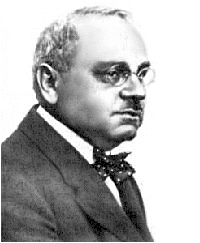Larry Cochran is a Canadian psychologist [1] and Professor of Counseling Psychology at the University of British Columbia.[ when? ] In his writings he argues that life cycles can be observed.
Larry Cochran is a Canadian psychologist [1] and Professor of Counseling Psychology at the University of British Columbia.[ when? ] In his writings he argues that life cycles can be observed.

Carl Ransom Rogers was an American psychologist and among the founders of the humanistic approach in psychology. Rogers is widely considered one of the founding fathers of psychotherapy research and was honored for his pioneering research with the Award for Distinguished Scientific Contributions by the American Psychological Association (APA) in 1956.

Alfred Adler was an Austrian medical doctor, psychotherapist, and founder of the school of individual psychology. His emphasis on the importance of feelings of belonging, family constellation and birth order set him apart from Freud and other members of the Vienna Circle. He proposed that contributing to others was how the individual feels a sense of worth and belonging in the family and society. His earlier work focused on inferiority, the inferiority complex, an isolating element which plays a key role in personality development. Alfred Adler considered a human being as an individual whole, and therefore he called his psychology "Individual Psychology".

Jerome Seymour Bruner was an American psychologist who made significant contributions to human cognitive psychology and cognitive learning theory in educational psychology. Bruner was a senior research fellow at the New York University School of Law. He received a BA in 1937 from Duke University and a PhD from Harvard University in 1941. He taught and did research at Harvard University, the University of Oxford, and New York University. A Review of General Psychology survey, published in 2002, ranked Bruner as the 28th most cited psychologist of the 20th century.

Humanistic psychology is a psychological perspective that arose in the mid-20th century in answer to two theories: Sigmund Freud's psychoanalytic theory and B. F. Skinner's behaviorism. Thus, Abraham Maslow established the need for a "third force" in psychology. The school of thought of humanistic psychology gained traction due to key figure Abraham Maslow in the 1950s during the time of the humanistic movement. It was made popular in the 1950s by the process of realizing and expressing one's own capabilities and creativity.

Qualitative research is a type of research that aims to gather and analyse non-numerical (descriptive) data in order to gain an understanding of individuals' social reality, including understanding their attitudes, beliefs, and motivation. This type of research typically involves in-depth interviews, focus groups, or observations in order to collect data that is rich in detail and context. Qualitative research is often used to explore complex phenomena or to gain insight into people's experiences and perspectives on a particular topic. It is particularly useful when researchers want to understand the meaning that people attach to their experiences or when they want to uncover the underlying reasons for people's behavior. Qualitative methods include ethnography, grounded theory, discourse analysis, and interpretative phenomenological analysis. Qualitative research methods have been used in sociology, anthropology, political science, psychology, social work, folklore, educational research and software engineering research.
Psychosynthesis is an approach to psychology that expands the boundaries of the field by identifying a deeper center of identity, which is the postulate of the Self. It considers each individual unique in terms of purpose in life, and places value on the exploration of human potential. The approach combines spiritual development with psychological healing by including the life journey of an individual or their unique path to self-realization.

Clinical psychology is an integration of human science, behavioral science, theory, and clinical knowledge for the purpose of understanding, preventing, and relieving psychologically-based distress or dysfunction and to promote subjective well-being and personal development. Central to its practice are psychological assessment, clinical formulation, and psychotherapy, although clinical psychologists also engage in research, teaching, consultation, forensic testimony, and program development and administration. In many countries, clinical psychology is a regulated mental health profession.

Counseling psychology is a psychological specialty that began with a focus on vocational counseling, but later moved its emphasis to adjustment counseling, and then expanded to cover all normal psychology psychotherapy.
Person-centered therapy, also known as person-centered psychotherapy, person-centered counseling, client-centered therapy and Rogerian psychotherapy, is a form of psychotherapy developed by psychologist Carl Rogers beginning in the 1940s and extending into the 1980s. Person-centered therapy seeks to facilitate a client's self-actualizing tendency, "an inbuilt proclivity toward growth and fulfillment", via acceptance, therapist congruence (genuineness), and empathic understanding.
A vocation is an occupation to which a person is especially drawn or for which they are suited, trained or qualified. People can be given information about a new occupation through student orientation. Though now often used in non-religious contexts, the meanings of the term originated in Christianity.

Narrative therapy is a form of psychotherapy that seeks to help patients identify their values and the skills associated with them. It provides the patient with knowledge of their ability to live these values so they can effectively confront current and future problems. The therapist seeks to help the patient co-author a new narrative about themselves by investigating the history of those values. Narrative therapy claims to be a social justice approach to therapeutic conversations, seeking to challenge dominant discourses that it claims shape people's lives in destructive ways. While narrative work is typically located within the field of family therapy, many authors and practitioners report using these ideas and practices in community work, schools and higher education. Narrative therapy has come to be associated with collaborative as well as person-centered therapy.
Existential psychotherapy is a form of psychotherapy based on the model of human nature and experience developed by the existential tradition of European philosophy. It focuses on concepts that are universally applicable to human existence, such as death, freedom, responsibility, and the meaning of life. Instead of regarding human experiences such as anxiety, alienation, and depression as implying the presence of mental illness, existential psychotherapy sees these experiences as natural stages in a normal process of human development and maturation. In facilitating this process of development and maturation, existential psychotherapy involves a philosophical exploration of an individual's experiences stressing the individual's freedom and responsibility to facilitate a higher degree of meaning and well-being in their life.
Depth psychology refers to the practice and research of the science of the unconscious, covering both psychoanalysis and psychology. It is also defined as the psychological theory that explores the relationship between the conscious and the unconscious, as well as the patterns and dynamics of motivation and the mind. The theories of Sigmund Freud, Carl Gustav Jung, and Alfred Adler are all considered its foundations.

In psychology and psychotherapy, existential crises are inner conflicts characterized by the impression that life lacks meaning or by confusion about one's personal identity. Existential crises are accompanied by anxiety and stress, often to such a degree that they disturb one's normal functioning in everyday life and lead to depression. Their negative attitude towards life and meaning reflects various positions characteristic of the philosophical movement known as existentialism. Synonyms and closely related terms include existential dread, existential vacuum, existential neurosis, and alienation. The various aspects associated with existential crises are sometimes divided into emotional, cognitive, and behavioral components. Emotional components refer to the feelings they provoke, such as emotional pain, despair, helplessness, guilt, anxiety, and loneliness. Cognitive components encompass the problem of meaninglessness, the loss of personal values, and reflections about one's own mortality. Outwardly, existential crises often express themselves in addictions, anti-social and compulsive behavior.
Individual psychology is a psychological method or science founded by the Viennese psychiatrist Alfred Adler. The English edition of Adler's work on the subject (1925) is a collection of papers and lectures given mainly between 1912 and 1914. The papers cover the whole range of human psychology in a single survey, and were intended to mirror the indivisible unity of the personality.
Christian counseling is distinct from secular counseling. According to the International Association of Biblical Counselors, Biblical counseling "seeks to carefully discover those areas in which a Christian may be disobedient to the principles and commands of Scripture and to help him learn how to lovingly submit to God's will." Christian counselors, therefore, approach psychology through the lens of the Bible. They see the Bible as the source of all truth.
Wounded healer is a term created by psychologist Carl Jung. The idea states that an analyst is compelled to treat patients because the analyst himself is "wounded." The idea may have Greek mythology origins. Victor et al. (2021), a pre-print study, found that 82% of applied psychology graduate students and faculty members in the United States and Canada experienced mental health conditions at some point in their lives.
Stephen Arroyo is an American best-selling author and astrologer.

Career counseling is a type of advice-giving and support provided by career counselors to their clients, to help the clients manage their journey through life, learning and work changes (career). This includes career exploration, making career choices, managing career changes, lifelong career development and dealing with other career-related issues. There is no agreed definition of career counseling worldwide, mainly due to conceptual, cultural and linguistic differences. However, the terminology of 'career counseling' typically denotes a professional intervention which is conducted either one-on-one or in a small group. Career counseling is related to other types of counseling. What unites all types of professional counseling is the role of practitioners, who combine giving advice on their topic of expertise with counseling techniques that support clients in making complex decisions and facing difficult situations.

Paul T. P. Wong is a Canadian clinical psychologist and professor. His research career has gone through four stages, with significant contributions in each stage: learning theory, social cognition, existential psychology, and positive psychology. He is most known for his integrative work on death acceptance, meaning therapy, and second wave positive psychology. He has been elected as a fellow for both the American Psychological Association and the Canadian Psychological Association.